Joseph Cheatle, Oxford College of Emory University
Eden Orwell, The University of Southern Mississippi
The initial idea for this project occurred during the Spring 2022 semester when Eden Orwell completed a final project for the peer tutor training course as a requisite for working in the Writing Center at the University of Southern Mississippi. She chose to conduct and present on a series of interviews with queer student-writers on campus concerning their perception (or view) of the writing center, their queerness, their own writing, and the relationship between these elements. While conducting these interviews, the same topic recurred time and again: personal writing and the role (or lack thereof) of the writing center. The students Eden spoke to expressed a great deal of pride and passion when discussing their personal writing projects, but they also consistently brought up the idea that the writing center is not intended for the use of non-scholastic works. As someone who enjoys creative writing and works as a peer tutor in the Writing Center, Eden found this through-line thought-provoking and worthy of additional inquiry; in particular, Eden was struck by the fact that student perception was different from how the writing center positions itself as a place where students can work on any – and all – types of composing.
When Eden started working in the Writing Center at the University of Southern Mississippi as a tutor, she had the opportunity to continue her research with Dr. Joseph Cheatle, Director of the University Writing Center. She applied for, and received, a research grant from the Eagle Scholars Program for Undergraduate Research (Eagle SPUR) sponsored by the Drapeau Center for Undergraduate Research at the University of Southern Mississippi. The grant is an opportunity for a faculty member to mentor an undergraduate student throughout the research process. As part of this research project, Eden functioned as the primary investigator, and Dr. Cheatle served in a support and mentoring role. In addition to fulfilling the requirements of the Eagle Scholars Program for Undergraduate Research, this research answers the need for additional research in writing centers as well as what R. Mark Hall (2017) terms the “growing chorus of calls for more student-led research” (p. 9).
Together, we worked on building upon Eden’s previous project while expanding the scope of it to consider both creative writing and professional documents, which, when combined, we considered “independent writing.” Independent writing is defined as writing that either occurs outside of the classroom or beyond disciplinary specific writing. We used poems, personal essays, songs, short stories, a script, or a novel as examples of creative writing (we recognize that these can be completed as part of a specific course but are just as likely, or more likely, to be completed outside of a course). We used resumes/CVs, cover letters, graduate/professional school applications, blogs, or personal websites as examples of professional writing. Our inquiry was guided by a series of questions we wanted to answer, including:
- How do student clients view the writing center?
- Are student perceptions of the writing center different when working on in-class works versus independent writing projects?
- Do students who use the center for independent writing projects have positive experience?
- Why, or why not, do students use the center for independent writing projects?
- What can writing centers do to promote their work on independent writing?
Using the writing center for creative and professional projects should be obvious. Over time, writing centers have evolved from working primarily within English departments serving composition students to serving the entire institution; therefore, tutors must be welcoming of, and prepared to work with, students from all disciplines. And when serving students from all disciplines, writing centers should be prepared to work with discipline-specific writing as well as other professional documents like cover letters, resumes, curriculum vitaes, and more. Writing centers should also be prepared to work with creative writing, including poems, short stories, blogs, novels, memoirs, and more. But, as Hughes (2009) points out, “meeting the needs of this diverse population also creates a challenge for tutors and administrators of writing centers” (3). Hughes goes on to question whether tutors are expected to be trained to focus on every university discipline.
So, while writing centers profess to work on all types of writing, we wanted to determine if, and why, students work on independent writing in the writing center. We also were intentional in that we wanted to view this topic from the perspective of the student writer in order to highlight their experiences. When searching for scholarship on independent writing, we found only one or two sources on professional documents and writing centers, and very few sources on creative writing and writing centers. The sources we did find point out the challenges that tutors have when working with independent writing, particularly creative writing. As Havva (2020), Cassorla (2004), LeBlanc (1994), and Pabo (1991) note, tutors view creative writing as different from composition or typical English assignments; tutors view it as its own discipline (similar to viewing engineering writing or science writing as a discipline). In these works, tutors expressed that working with creative writers required specialized training and that they were concerned with their lack of familiarity with that discipline; in fact, tutors also indicated that they often do not have the expertise to accurately critique a student’s poem, story, script, or play.
While there are some sources (Havva 2020;Hughes 2009; Cassorla 2004; Hime and Mowrer 2003; LeBlanc 1994; and Pabo 1991) that address creative writing and the writing center, there were few sources that we found addressing professional documents. That does not mean that there are not sources on creative and professional writing; rather, it shows that there is not a broad proliferation of sources available and, if there are additional sources, they are more difficult to find. One particular source, Lori Rochelle Hughes’ (2009) dissertation, “Tutoring Technical Document in the Writing Center: Implications for Tutor Training and Practice,” did address professional documents and writing centers. In it, she notes that professional documents have requirements unique to that genre and should be treated as its own discipline. The available previous literature shows the challenges that tutors face in working with both creative and professional writing while also highlighting the anxieties that tutors may feel when working with these genres. The lack of previous work in this area of writing center studies is important because it illustrates that writing centers have not given much attention to it; further, it may show some fundamental assumptions among writing center administrators that students working on independent writing will naturally feel that they can work on those at the center. Our work shows that this assumption is not necessarily true and that there is a divide between what kinds of works students may feel comfortable bringing to the center for help.
Methods
This research project used both quantitative and qualitative methods to explore independent writing. Specifically, we used a survey (Appendix 1) that then informed the questions we asked during follow-up interviews (Appendix 2) with a select number of participants. This project was approved by the Institutional Review Board at the University of Southern Mississippi (protocol number 23-0016). In addition to demographic questions, we sought to determine:
- Student awareness (about what they know and understand) of the Writing Center and its purpose
- Student perceptions (positive or negative view) of the Writing Center and the ability of the Writing Center to help them
- Whether, in general, students work on independent writing projects
- If students worked with an independent writing project with the Writing Center
- The experiences of students who brought an independent writing project to the Writing Center
The survey relied primarily on Likert scale questions. We distributed the survey throughout the University of Southern Mississippi campus. Our institution is a Carnegie R1 research institution that functions as a state regional institution, enrolling around 12,000 students each year. The writing center features about 14 tutors, including undergraduate, graduate, and professional tutors. 123 students completed the survey, including 85 (69.11%) undergraduate students and 38 graduate students (30.89%).
Among undergraduate students, each academic year was represented, including 14 first- year students (11.38%), 22 sophomore students (17.89%), 12 junior students (9.76%), and 37 senior students (30.08%). At our institution, we have “schools” rather than departments. While the largest number of participants came from the School of Humanities (which encompasses English, History, Philosophy, and Religion), that only accounts for 14% of participants. Students in high numbers also participated from the School of Education (12.59%), School of Criminal Justice, Forensic Science and Security (9.63%), and School of Media Communication (8.89%). Out of 32 Schools, 25 were represented in the survey participants.
In order to gain greater insight into the experiences and perspectives of the students, 5 interviews were conducted with respondents that indicated they had attended the writing center with a piece of independent writing and were open to being interviewed about their experiences. The in-person interviews utilized open-ended questions that focused on students’ relationship to independent writing, experiences with such writing in the center, and general perceptions of the writing center. Between all five, there was a great diversity of experiences, backgrounds, and perspectives. Out of those interviewed, three were graduate students, and two were undergraduate students. Of the graduate students, two were from the School of Education while one was from the School of Biological, Environmental and Earth Sciences. Of the undergraduates, one was from the School of Social Work, and one was from the School of Social Science and Global Studies.
We felt that using a quantitative and qualitative mixed-methods approach to research would provide us the most information and a more nuanced understanding regarding independent writing. According to Guetterman, Fetters, and Creswell (2015), a mixed- methods approach to research draws on the strengths of both approaches. While quantitative research allowed us to reach a larger number of participants and collect more data, qualitative research allowed us to investigate the complex relationship students have with writing (McKinney 2016). We integrated these methods together by starting with a quantitative survey that then informed the questions we asked in qualitative interviews. In this way, we were able to use the interviews to provide a deeper understanding of our survey results.
Results
We began the survey with demographic questions before asking students about their perception, awareness, and understanding of the Writing Center. Specifically, we asked, “How would you rate your awareness/understanding of the Writing Center and its purpose?” (Figure 1).

Students indicated a high awareness and understanding of the Writing Center. 59 students (47.97%) indicated that they were “Aware,” while 41 students (33.33%) were “Very aware” of the Writing Center and its purpose. Only six students (4.88%) were “Unaware,” and six students (4.88%) were “Very Unaware,” of the Writing Center and its purpose.
We then asked, in Figure 2, “If you are working on a writing project and feel like you could benefit from guidance or advice, how likely are you to visit the Writing Center?”.
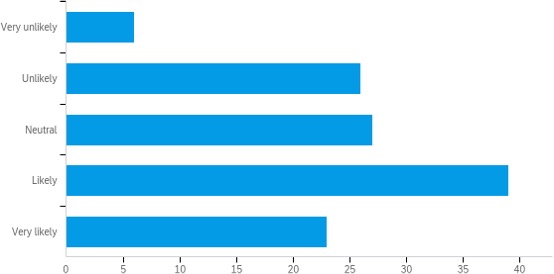
Among the students that responded to this question, 62 students (51.24%) indicated that they were either “Likely” or “Very likely” to visit the Writing Center for a writing project. Meanwhile, only 32 participants (26.45%) indicated that they were “Unlikely” or “Very unlikely” to visit the Writing Center.
Students were also asked if they had ever visited the Writing Center (Figure 3).
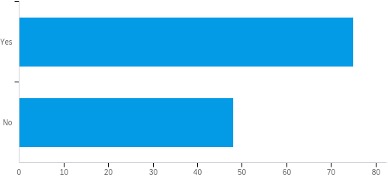
75 students (60.98%) indicated that they had visited the Writing Center while only 48 students (39.02%) indicated that they did not visit the Writing Center.
We then turned towards independent writing projects. 106 students indicated that they had worked on a total of 462 independent projects during their time at the institution, spanning a wide variety of projects, as shown in Figure 4, below.
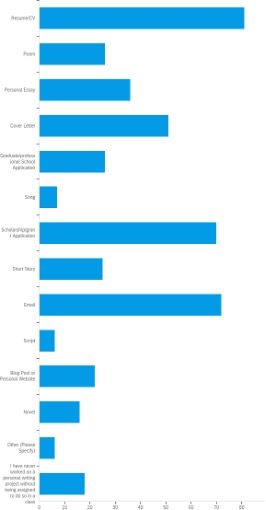
The most frequent independent projects students worked on were resumes/CVs (81 or 17.53%), emails (72 or 15.57%), scholarship/grant applications (70 or 15.15%), and a cover letters (51 or 11.04%).
Students were then asked, as depicted in Figure 5, “While working on a personal writing project, are you more or less likely to visit the writing center than when working on a class assignment?” Students indicated less enthusiasm for working with the Writing Center on independent writing projects than for attending the writing center in general.
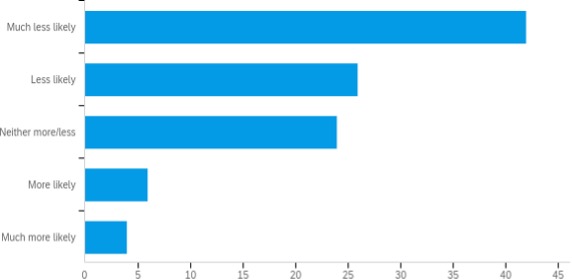
68 participants, or 66.67%, indicated that they were either “Less likely” or “Much less likely” to visit the Writing Center for an independent writing project. Meanwhile, only ten participants, or 9.80%, were “More likely” or “Much more likely” to visit the Writing Center for an independent writing project. And only 24 participants, or 23.53%, were “Neither more/less” likely to visit the Writing Center for an independent project.
There were very few students who indicated that they came to the Writing Center for an independent writing project. Among those that came to the Writing Center for an independent writing project (Figure 6 below), 19 students (17.92%), all of them indicated that they came for professional documents, and 5 students (33.33%) indicated that they also brought creative writing projects to the center. Students were twice as likely to bring professional writing projects to the Writing Center for assistance compared to creative writing projects.
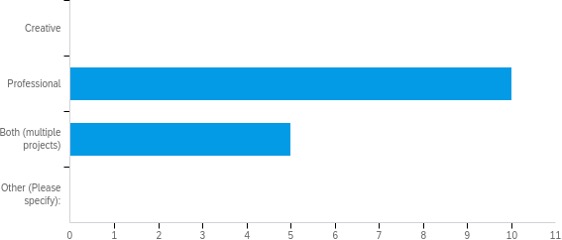
Figure 7, below, provides feedback from students who used the Writing Center for independent writing projects. Students were asked how helpful their visit was:
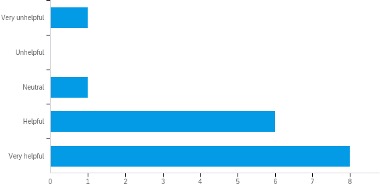
Only one student indicated that coming to the Writing Center for their independent writing project was either “Unhelpful” or “Very unhelpful.” Meanwhile, for those that used the Writing Center for independent writing projects, 15 students (87.50%) indicated that the experience was either “Helpful” or “Very helpful.”
Students who used the Writing Center for independent writing projects were asked to indicate how prepared tutors were to help them (Figure 8). 14 students (87.50%) indicated “Prepared” or “Very prepared” when asked “How well prepared was the tutor to assist you with your personal writing?” Only one student felt that their tutor was “Very unprepared” to help them.
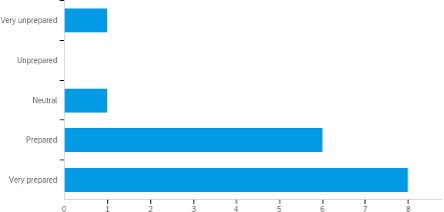
Lastly, students who visited the center for independent writing projects were asked, in Figure 9, how likely they were to return to the Writing Center for another independent writing project.
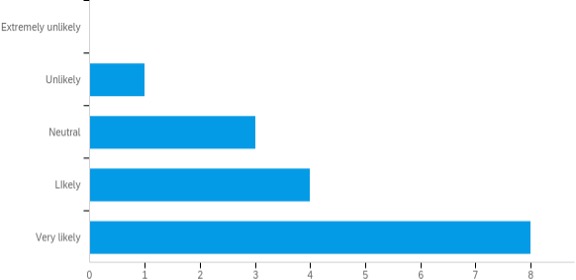
4 students (25%) indicated that they were “Likely” to return to the center if they were working on a personal writing project, while 8 students (50%) indicated that they were “Very likely” to return. Combined, 12 students (75%) indicated that they were likely to return to the writing center if they were working on a personal writing project. Only one student indicated that they were “Unlikely” to return.
In addition to surveys, five students were asked in interviews what independent work they had engaged with over the course of their time at USM. One student indicated that they had worked on personal essays and emails, one indicated they had worked on a resumes/CVs, blog posts, emails, and a novel, one indicated they had worked on a scholarship/grant application, one indicated they had worked on a resume/CV, a cover letter, and emails, and another that they had worked on a resume/CV. There was a substantial variety between interview subjects concerning the forms of independent writing that they engaged in. These interviews are used to complement survey data and are included in the discussion section where results from the surveys are considered.
Discussion
Five key points of information can be taken away from data collected through the surveys and interviews:
1. Students Have an Overall Positive Perception and Awareness of the Writing Center
Students indicated a high awareness of the Writing Center and its purpose (Figure 1). Overall, 100 students (81.30%) were “Aware” or “Very Aware” of the Writing Center and its purpose. Only 10 students (9.76%) were either “Unaware” or “Very unaware” of the Writing Center and its purpose. It is clear that students have a high understanding that there is a Writing Center at the institution and generally what its purpose is. When all students, including those who did not come to the Writing Center for any reason, were asked “If you are working on a writing project and feel like you could benefit from guidance or advice, how likely are you to visit the Writing Center?” (Figure 2), students were more likely than not (at 51.24% to 26.45%) to visit the Writing Center. Because a number of students have never attended the Writing Center (48 students, 39.02%, Figure 3), it is clear that even students who did not attend the center were likely to be aware of the center, know its purpose, and be willing to use its services at some point in the future.
2. In General, Students are Working on a lot of Different Independent Writing
We might ask the question, “Why does independent writing matter to writing centers?” Figure 4 indicates the vast array, and number, of independent writing projects students worked on during their time at the institution. 106 students indicated that they were working on a total of 462 independent writing projects. They were primarily working on resume/cvs, scholarship applications, emails, cover letters, personal essays, poems, short stories, and more. The high number, and breadth, of independent writing projects indicates that students are frequently working on these types of writing. Furthermore, since students are working on them, writing centers may already–or may want to–position themselves to address student concerns in this area. Furthermore, independent writing marks a potentially large field for writing centers to work with.
3. When it comes to Independent Writing, the Perception of the Writing Center is Different
While students have a generally positive view of the writing center, they were less likely to view the writing center positively in light of independent writing. In Figure 5, student were asked the likelihood of visiting the Writing Center for an independent project. 68 participants, or 66.67%, indicated that they were either “less likely” or “much less likely” to visit the Writing Center for an independent writing project. This negative viewpoint is in juxtaposition with the positive data in Figure 2, which asks how likely students are to visit the Writing Center. 62 students (51.24%) indicated that they were either “Likely” or “Very Likely” to visit the Writing Center for a writing project. Interviews reinforced this juxtaposition between writers who hold a positive viewpoint of the center in general but a more skeptical view of the Writing Center in terms of independent writing. One interviewee who writes children’s books said, “I’ve never thought of having someone [from the Writing Center] help me with my creative writing.” They go on to say that they use a professional editor to help them with their work, “When I work on my book, I pay someone so I feel it would be like free work [to use the Writing Center].” Another interviewee said that, “I didn’t know that [the Writing Center] was even an option” for independent writing. It is striking that the positive perception of the writing center to help a student does not necessarily extend to independent writing projects.
4. Students Worry that Tutors may not have Expertise in their Area of Writing
Beyond the reason for attending the center, interviews also revealed a great deal about student experiences with the center both before and during tutoring sessions. Though these students claimed that they all found their tutoring experiences helpful, several also mentioned a notable deficiency in their tutor’s ability to advise on field-specific modes of writing. This touches on the debate between generalist and specialist approaches to tutoring. While this debate is old and well-worn, it is worth mentioning that, when pressed, every student that mentioned such a frustration confirmed that their tutor was helpful and openly discussed the limitations of their expertise with the student. When asked about the Center’s outreach and communication efforts, interviewees also repeatedly stated that they did not closely read campus-wide emails and that their only understanding of the services offered by the Center came via peers and instructors through word of mouth. Students thus appear to be making the decision about whether or not the Center offers services appropriate for their needs primarily upon secondary or tertiary information and rarely direct Center communications. This might help to explain why so many students don’t come to the Center to work on independent writing projects – because they may not be getting the center’s messaging that tutors can work on independent writing projects.
In the interviews, questions focused on student experiences in the center and the efficacy of the Center’s communication efforts. When discussing their reason for attending the Center, students consistently used a variation of the phrase, “I just wanted to get another pair of eyes on it,” describing a sense of uncertainty and unease in the absence of an instructor’s guidance. Despite the fact that the students claimed to be highly confident in their writing and that they did not come into the center seeking editing/proofreading services, they still felt uneasy submitting independent writing for any form of review before having a trained professional’s approval. This adds dimension to the survey finding that 14 of the 19 students (73.68%) that brought independent writing to the center also indicated that they were more likely to struggle while working on an independent project in the absence of an instructor to provide guidance, feedback, and support. It appears that the source of this anxiety does not lie in the students’ perception of their own skills but rather in their general lack of certainty without a readily accessible authority on the matter.
This point touches on the generalist versus specialist debate which has existed in some form since the origin of writing centers (Devet 2014). While specialists offer some benefits to writing centers, it is not practical to staff specialists for each discipline and major. According to Devet (2014), “No directors can hire tutors for every discipline at a college or university: the staff is just not there. Then, too, training tutors as specialists assumes disciplinary writing is monolithic […]”. Another issue with training specialist tutors is that it does not recognize the many varieties in disciplinary writing.
5. If Students come to the Center for an Independent Project, they are Likely to have a Positive Experience and Return to the Center.
Even though students were wary of the ability of writing tutors to work with independent writing, those students who did work with tutors on an independent writing project indicated that they have a positive experience. When students used the Writing Center for independent writing projects, they generally reported a positive experience. According to Figure 7, of those who used the Writing Center for an Independent Writing Project, 15 students (87.50%) indicated that the experience was either “Helpful” or “Very helpful” when asked to rate the helpfulness of the Writing Center to assist on their independent writing project. Only one student rated the center as “Very unhelpful.” One interviewee noted that they use the Writing Center frequently for independent writing projects, especially those related to formal letters (like application letters), internship applications, exchange programs, and other similar documents. It seems counterintuitive, but they note that because “professional writing documents are very standard,” they “trust that [feedback] more” from the center. In this case, the general predictability of the genre gave them confidence in the center to help them.
Students who completed the survey also indicated that tutors were prepared to help them on independent writing projects. According to Figure 8, 14 students (87.50%) indicated that the tutor who worked with them on an independent writing project was either “Prepared” or “Very prepared” to work with them. Only one student indicated that their tutor was “Very unprepared” to work on an independent writing project. The fact that the center was rated helpful and that tutors were prepared to work on independent writing indicates that writing centers are able to work with independent writing and provide a helpful experience. This is without extensive training in independent writing projects nor purposefully hiring tutors who excel at independent writing.
Lastly, students who used the center for independent writing projects were asked how likely they were to return to the center. The overwhelming majority, 75% of respondents, indicated that they are “Very likely” or “Likely” to return to the Writing Center. Only 6.25% indicated that they were “Unlikely” to return to the Writing Center. Overall, this data supports the finding that students generally have a positive experience when bringing independent writing to the Writing Center and are likely to return.
Conclusion
Drawing upon the previous discussion section, we provided our Writing Center, and the field of writing center studies, with a set of recommendations intended to improve the relationship between it and independent writers across campus. Focusing on outreach, student perception, and student experiences in the center, the recommendations are to:
- Explicitly inform the student population of the specific services offered by the writing center, including tutoring for independent writing;
- Direct such information and other outreach efforts through faculty/staff via emails and the Writing Center syllabus insert, and directly to students through in-class presentations and workshops;
- And, build on the strengths of writing center personnel who may have experience working with independent writing. Advise and train Center staff to familiarize themselves with each other’s specializations so as to better recommend tutors with relevant experience or knowledge when working with students engaged in area-specific writing.
Though we consider the findings of this study to be helpful, there is still room for improvement, and further study must be done to determine key pieces of information not present in these results. As previously stated, the sample procured in this research is not considered to be representative of the broader student population. When considering such points of interest as the true level of awareness and understanding of the Center held by students, a more quantitatively focused and statistically-conscious study would be necessary in order to procure conclusive data upon which to base more meticulous outreach strategies. Additionally, a representative sample would grant future researchers the opportunity to draw more precise conclusions about the pervasiveness and breakdown of independent writing amongst the student body.
Though this study revealed a great deal about the perceptions and patterns of Writing Center engagement by USM independent writers, there were several key limitations. First and foremost, more respondents would have been provided the opportunity to make more definitive claims about the student population. The second is that there were only five interviews completed, which means that we had less qualitative data than we would have liked. The third is that this study was conducted at only one institution; therefore, the results apply primarily to that institution. And, we would have liked to expand the scope of the study but were limited by the timeframe of Eden’s grant funding.
Beyond a greater and more representative survey sample, future studies may benefit from a higher number and diversity of interviewees. Though this study was primarily concerned with the perceptions and experiences of independent student writers that had brought such work into the center and thus only interviewed those students, interviews with students from the other two groups within this study (independent writers that have not brought such work to the center and non-independent writers) may provide further insight. By formulating open-ended questions that may be more universally applicable to the student body and asking them of all student groups, a better understanding of the nuanced differences between such groups may be gathered. Additionally, a larger sample size (or even focus group) for interviewees than that gathered in this study could be beneficial in allowing researchers to make more assertive claims about the insights provided.
Independent writing projects represent an important aspect of writing center work. This may be because students working on these projects use the writing center as a resource, or it may be because the writing center wants to work with students on independent writing projects. For writing centers that may not currently work with independent writing, they may want to start engaging with students working on independent writing. Ultimately, this work functions as a starting point to draw attention to independent writing and writing centers; we hope to spur conversation, research, and scholarship about independent writing. And, as a starting point, we look forward to exploring independent writing further and determining the most effective ways of engaging with this important aspect of writing centers.
References
Cassorla, L. (2004). “Tutor attitudes toward tutoring creative writers in writing centers.” ProQuest. University of South Florida.
Devet, B. (2014). “Using metagenre and ecocomposition to train writing center tutors for writing in the disciplines.” Praxis: A Writing Center Journal 11(2).
Dinitz, S., & Harrington, S. (2014). “The role of disciplinary expertise in shaping writing tutorials.” The Writing Center Journal 33(2), 73-98.
Guetterman, T., Fetters, M., & Creswell, J. (2015). “Integrating quantitative and qualitative results in health science mixed methods research through joint displays.” Annals of Family Medicine 13(6), 554-561.
Hall, R. M. (2017). Around the texts of writing center work: An inquiry-based approach to tutor education. Boulder: Utah State University Press.
Havva, Z.O. (2020). “Tutoring creative writers in the writing center.” Praxis: A Writing Center Journal 18(1).
Hime, J.E., & Mowrer, K.J. (2003). “Eight ways to tutor creative writers.” The Dangling Modifier 10(1).
Hughes, L. (2009). “Tutoring Technical Documents in the Writing Center: Implications for tutor Training and Practice.” Dissertation.
LeBlanc, D. (1994). “Teaching creative writing in writing centers.” The Writing Lab Newsletter 19(9), 1-4.
McKinney, J.G. (2016). Strategies for writing center research. Anderson, SC: Parlor Press.
Pabo, K. “Creative writing and the writing center.” The Writing Lab Newsletter, 15(6), 5-7.
Appendix 1: Examining Independent Student Writers’ Perceptions of the Writing Center
Q1
Survey Consent Form
Project Title: Examining Independent Student Writers’ Perceptions of the Writing Center Protocol Number: 23-0016
Principle Investigator: Eden Duley Research Advisor: Dr. Joseph Cheatle Email: w10010900@usm.edu
- Purpose: The purpose of this project is to provide a better understanding of how students at the University of Southern Mississippi use the Writing Center to work on writing outside of the classroom.
- Description of Study: This research project aims to investigate student-writer perceptions of the Writing Center as it relates to personal works, especially creative writing projects using a survey and interviews. We hope to determine what benefits and services, if any, do student writers believe the writing center has to offer for those working on personal writing projects. We also hope to provide recommendations for the Writing Center on how to improve services for creative writing projects and how to successfully outreach to creative writers throughout the institution.
- Benefits: This project has the potential to benefit students who are working on non- classroom related writing projects.
- Risks: There are no risks associated with this projects.
- Confidentiality: All data collected will be kept confidential, including any demographic information provided in the survey.
- Participant’s Assurance: This project and this consent form have been reviewed by the Institutional Review Board, which ensures that research projects involving human subjects follow federal regulations. Any questions or concerns about rights as a research participant should be directed to the Chair of the Institutional Review Board, The University of Southern Mississippi, 118 College Drive #5125, Hattiesburg, MS 39406-0001, 601-266-5997.
Any questions about this research project should be directed to the Principal Investigator using the contact information provided above.
Consent to Participate in Research: I understand that participation in this project is completely voluntary, and I may withdraw at any time without penalty, prejudice, or loss of benefits. All personal information will be kept strictly confidential, including any identifying information. By clicking the box below, I give my consent to participate in this research project. If you do not wish to participate in this study, please close your browser now. Yes, I consent to participate
- Yes, I consent to participate (1)
- No, I don’t consent to participate (2)
Q2 Year of Study
- First-year (1)
- Sophomore (2)
- Junior (3)
- Senior (4)
- Graduate Student (5)
Q3 Please indicate the school of your major (Check all that apply for multiple majors). If you are undecided, please choose “Undecided.”
▢ Center for STEM Education (1)
▢ Department of Aerospace Studies (2)
▢ Department of Military Science (3)
▢ School of Biological, Environmental and Earth Sciences (4)
▢ School of Coastal Resilience (5)
▢ School of Computing Sciences and Computer Engineering (6)
▢ School of Construction and Design (7)
▢ School of Criminal Justice, Forensic Science and Security (8)
▢ School of Humanities (9)
▢ School of Interdisciplinary Studies and Professional Development (10)
▢ School of Mathematics and Natural Sciences (11)
▢ School of Media Communication (12)
▢ School of Music (13)
▢ School of Ocean Science and Engineering (14)
▢ School of Performing and Visual Arts (15)
▢ School of Polymer Science and Engineering (16)
▢ School of Social Science and Global Studies (17)
▢ School of Accountancy (18)
▢ School of Finance (19)
▢ School of Leadership (20)
▢ School of Management (21)
▢ School of Marketing (22)
▢ School of Child and Family Sciences (23)
▢ School of Education (24)
▢ School of Kinesiology and Nutrition (25)
▢ School of Library and Information Science (26)
▢ School of Psychology (27)
▢ School of Social Work (28)
▢ School of Health Professions (29)
▢ School of Leadership and Advanced Nursing Practice (30)
▢ School of Professional Nursing Practice (31)
▢ School of Speech and Hearing Sciences (32)
▢ Undecided (33)
Q4 How would you rate your awareness/understanding of the Writing Center and its purpose?
Q5 Have you ever received an informational presentation about the Writing Center?
- Yes (1)
- No (2)
- Unsure (3)
Q6 Has a professor/instructor ever recommended the Writing Center as a resource?
- Yes (1)
- No (2)
Q7 Has a professor/instructor ever offered extra credit for attending the Writing Center?
- Yes (1)
- No (2)
Q8 Have you ever visited the Writing Center?
- Yes (1)
- No (2)
Q9 From your current understanding, which of the following statements best describes the purpose and services offered by the Writing Center? (Please choose all that apply)
▢ To edit and proofread students’ writing assignments before they are turned in for a grade (1)
▢ To teach students the fundamentals of grammar and writing so that they may better complete all future writing assignments (2)
▢ To guide students through the writing process of individual assignments so that they may better complete the specific writing assignment and all future assignments (3)
▢ To provide general feedback and professional guidance to students concerning writing of any kind so that they may become better writers (4)
▢ Other (Please explain) (5)
Q10 If you are working on a writing project and feel like you could benefit from guidance or advice, how likely are you to visit the Writing Center?
Q11 Are you a transfer student?
- Yes (1)
- No (2)
Q12 Not including this semester, for how many semesters have you attended USM?
- 1 semester (1)
- 2 semesters (1 year) (2)
- 3 semesters (3)
- 4 semesters (2 years) (4)
- 5 semesters (5)
- 6 semesters (3 years) (6)
- 7 semesters (7)
- 8+ semesters (8)
Q13 Did your previous institution have a writing center or similar service?
- Yes (1)
- No (2)
- Unsure (3)
Q14 Did you ever visit the writing center at your previous institution?
- Yes (1)
- No (2)
Q15 In your time at USM, have you ever worked on a personal writing project that wasn’t a class assignment? (Check all that apply)
▢ Resume/CV (1)
▢ Poem (2)
▢ Personal Essay (3)
▢ Cover Letter (4)
▢ Graduate/professional School Application (5)
▢ Song (6)
▢ Scholarship/grant Application (7)
▢ Short Story (8)
▢ Email (9)
▢ Script (10)
▢ Blog Post or Personal Website (11)
▢ Novel (12)
▢ Other (Please Specify) (13)
▢ I have never worked on a personal writing project without being assigned to do so in a class (14)
Q16 On average, roughly how many personal writing projects do you work on every semester?
o 1 (1)
o 2 (2)
o 3 (3)
o 4 (4)
o 5+ (5)
Q17 While working on personal writing projects, how often do you struggle without the guidance of a professor/instructor?
Q18 While working on a personal writing project, are you more or less likely to visit the writing center than when working on a class assignment?
Q19 While working on a personal writing project, have you ever visited the Writing Center for assistance?
- Yes (1)
- No (2)
Q20 How would you characterize the personal project(s) that you brought to the center?
- Creative (1)
- Professional (2)
- Both (multiple projects) (3)
- Other (Please specify): (4)
Q21 How helpful did you find the tutoring session(s) for your personal writing project?
Q22 How well prepared was the tutor to assist you with your personal writing?
Q23 How likely are you to return to the writing center if you work on a personal writing project?
Q24 Are you willing to be interviewed on your experience in the Writing Center and your perception of the Writing Center to assist with your personal writing projects?
- Yes (1)
- No (2)
Q25 Please provide your name and email
Appendix 2: Interview Questions
- Please describe your experiences with independent writing, which is defined as creative writing (like novel, short story, poetry) or professional writing (like resumes, cvs, cover letters, etc.)
- How many independent writing projects do you complete each year? What about during your time at USM?
- Did you bring in any professional writing projects in to the writing center? If so, could you tell me about that? (potential follow ups: Why did you bring it/them in? What kind of a project(s)? Have you ever brought a creative work in?)
- Did you bring in any creative writing projects in to the writing center? If so, could you tell me about that? (potential follow ups: Why did you bring it/them in? What kind of project(s)?)
- Are you more willing to come to the Writing Center for creative writing projects or professional writing projects? Explain further.
- Did you have any reservations about bringing this kind of work to the writing center? If so, why?
- Describe your tutoring experience here at the writing center.
- How could tutors improve your experience while working with them on personal projects?
- What is your understanding of the writing center and its purpose?
- How well do you feel the writing center conveys and spreads awareness of its purpose? How do you think the center could better convey and spread awareness of its purpose?
